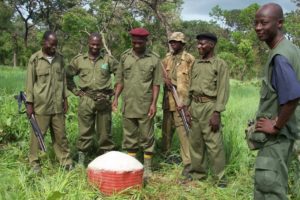A two-month series of extreme fitness challenges designed to show the arduous work of wildlife rangers launched on Wednesday, July 31, 2024, World Ranger Day, to raise millions of dollars to conserve Africa’s natural landscapes.

The wildlife ranger Challenge connects over 170 wildlife ranger teams from 24 African countries and symbolises the growing movement of global solidarity with the wildlife ranger profession. Teams participate in a series of mental and physical challenges that culminated September 21, 2024, in a multi-nation half-marathon across some of Africa’s most remote and beautiful landscapes.
The Challenge is organised by Tusk and the Game Rangers Association of Africa (GRAA) with support from founding donor, the Scheinberg Relief Fund. Launched in 2020, the event has already raised more than $18.5 million to support more than 13,300 wildlife rangers who together protect more than 60 million hectares across Africa – an area larger than Kenya.
Africa’s wildlife rangers are tasked with the daunting role of protecting species and endangered ecosystems and endure harsh conditions, long hours, and immense risks, while facing underfunding, threats, and challenging working environments.
The wide-ranging duties of a wildlife ranger are not often understood. Responsibilities incorporate anti-poaching operations and law-enforcement, but also include habitat monitoring, environmental education, fire management, dog training, ecological research, intelligence gathering, the collaring of wildlife and removal of snares, assisting injured animals and acting as emergency first-responders for local civilians.
The Challenge aims to elevate the wildlife ranger profession, showcase their diverse roles and challenges, raise funds for their crucial conservation work, and build a supportive community among participants.
Precious Malapane, Operations Manager, K9 Unit Ranger and Dog Trainer of Southern African Wildlife College, said: “The wildlife ranger Challenge is about honouring Rangers, who work as nature’s eyes and ears. The more funds that are raised through WRC, the more boots on the ground there will be to protect the natural world. It is our duty to make sure we protect wildlife for future generations. I don’t want my children to know about Rhino from photographs. They need to see them alive, free and walking on the savanna.”
The cornerstone of a ranger’s role is liaison with local communities. Rangers act as diplomats, educators, intermediaries and peacekeepers, educating local people as to the broad benefits of wildlife conservation and encouraging them to live peacefully alongside endangered wildlife.
Charlie Mayhew OBE, Founder and President of Tusk, said: “We all know this is a critical time in the story of life on Earth. In less than 50 years we have lost nearly 70% of the planet’s mammals, birds, fish and reptiles. This loss of nature and biodiversity profoundly affects us all: we depend on it for survival. One pragmatic strategy to help halt the loss of nature is to fully recognise, respect and invest in the vital work of wildlife rangers: thousands of brave men and women who work as guardians of vast areas of the planet’s land and water.”
Despite the vital nature of their varied work with both wildlife and people, the wildlife ranger profession is not fully understood. To be a ranger in Africa is to carry out hazardous and sometimes life-threatening work. They face threats to life from armed poachers and illegal wildlife trafficking networks, as well as attacks from predatory animals: violence, injury, disease and death are not uncommon in the line of duty.
Rangers endure tropical diseases, dehydration, bushfires and the isolating effects of long periods away from home. There is also a critical lack of insurance cover for rangers and their families: 50% of Rangers have no life insurance.
Andrew Campbell, Chief Executive Officer of GRAA, said: “Despite the risks they take and the incalculable value of their contribution to conservation, Africa’s wildlife rangers are often undervalued, under-resourced, under-paid and under-equipped. They frequently experience poor working conditions. Long hours, absence of adequate training and the lack of essential equipment such as first aid kits, boots, radios, tents, and vehicles are all too common. In order to protect the planet’s remaining biodiversity, we must fully recognise that wildlife rangers are key workers of conservation and are integral to urgent global efforts to maintain the world’s ecological balance.”
The wildlife ranger Challenge has become a lifeline for Africa’s Rangers. It raises vital matched funds that help to improve working conditions and provide professional training and field equipment.
Nick Bubb, CEO of Tusk, said: “The internationally agreed biodiversity plan of 30×30, would require a huge increase in the number of employed wildlife rangers needed to achieve climate mitigation and biodiversity goals. Focussed events such as the WRC allow Ranger teams to unlock much needed grants and galvanise international support for the profession.”
